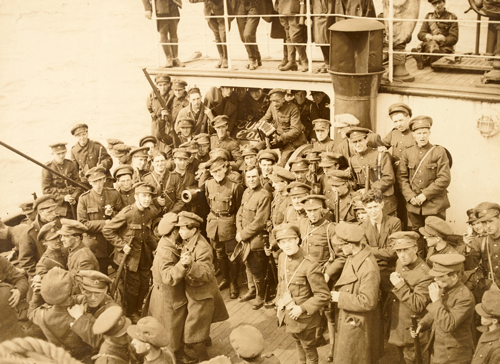Plans for big reduction in Irish Army size before the end of 1923
Next 2-3 weeks will show which way country is headed as Johnson urges end to military courts
Dublin, 1 June 1923 -The Irish National Army is to be drastically reduced in size. The number of National Army soldiers currently stands at 49,000, but the Free State government plans to shrink this number between 28,000 and 30,000 by the end of the year.
General Richard Mulcahy, commander in chief of the National Army and Minister for Defence, explained to the Dáil today that while the government may lack experience dealing with the type of situation that has prevailed over the last year, it was hopeful that the country was now on the threshold of having peaceful conditions. General Mulcahy added that in such circumstances, around which there were many major risks, it would not be appropriate to make deeper cuts to the army’s ranks.
There remains, he insists, a military necessity for using the army for all manner of tasks at the moment. However, over the next two to three weeks, it should become clear whether the country was changing in the direction in which it would be possible for the government to alter its attitude towards suspects, prisoners and people convicted of certain types of crime.
General Mulcahy said that he was open-minded as to the use of soldiers for construction as opposed to army work. For instance, in certain parts of the country where military risks were identified, an arrangement has been reached with the Postmaster General for small groups of soldiers to be deployed to restore telegraph lines. Soldiers had also been put to use in road-mending and bridge-building. According to General Mulcahy, in six or eight weeks in Co. Kerry, the national Army had built over forty bridges, bringing relief to the local civilian populations. However, there was no policy under consideration where the Army was going to be put to do the work of the County Council.
British Pathé Footage of young men enlisting in the free state army in 1922
The future of the National Army was raised in the context of a
Dáil debate on the army estimate of £7,164,500 to
cover the last 8 months, with £10,664,500 earmarked for the
year as a whole.
However, given that the army appeared to be in a state of
reorganisation, the Labour leader Mr. Thomas Johnson wondered
whether it would be better to postpone to a later date the
consideration of the army estimate.
Mr. Johnson also urged the abandonment by the Government of the Military Courts, and particularly Military Courts held in secret, which had previously been defended on the grounds of a military necessity that no longer holds.
The question of military necessity is also linked to the issues of army finances, as was, Mr. Johnson made clear questions around policies of ‘searchings, arrests and imprisonments’,the detention of prisoners and for how long. ‘The number of prisoners still in the control of the Army is said to be round about 12,000’, he said for reasons related to alleged sympathy with Irregular activity. ‘There are 12,000 men and women under arrest, and I ask the Ministry to tell the Dáil whether they have come to any conclusion as to the length of time that it would be necessary to hold these prisoners, whether the intention is to hold them all until they are satisfied that every gun, every rifle, every round of ammunition, and every pound of explosive material has been raked up, and whether they have made any estimate, any calculation, as to how long it will take to make that general rounding up.’
‘Can we take it that if the promise of that cessation is fulfilled there will be a steady release of prisoners and a general stoppage of the military activities, the searches, the arrests, and such-like on the part of the Army authorities?’
[Editor's note: This is an article from Century Ireland, a fortnightly online newspaper, written from the perspective of a journalist 100 years ago, based on news reports of the time.]





















